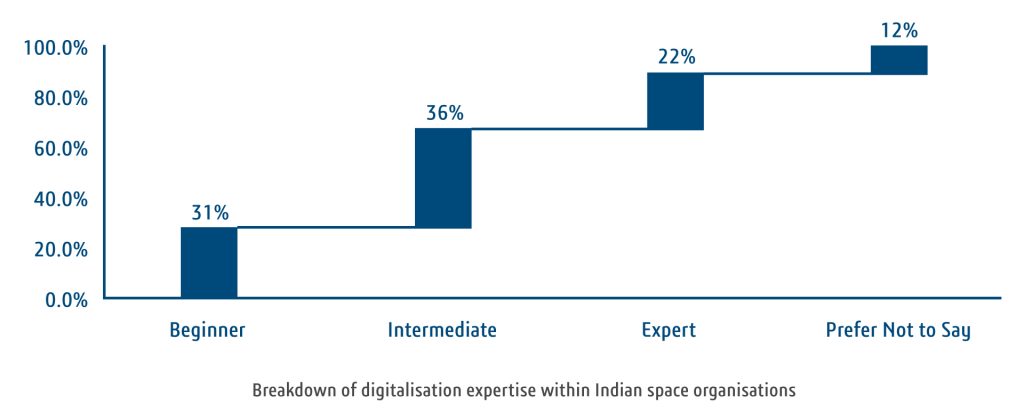The Government of India (GoI) is currently carrying out reforms aimed at opening space activities in the country to more private sector stakeholders. To take full advantage of these reforms, it will be important for domestic and international space organisations to use key insights into the current state of the space ecosystem.
According to media reports and statements by the Chairman of the Indian Space Research Organisation (ISRO), there are many local suppliers in India that support the agency, but it’s not clear who they are, what their capabilities cover, and how exactly they contribute to the national space program.
To address this issue, Dassault Systèmes, in partnership with the global space marketplace satsearch, has conducted a unique trade study of 281 Indian space sector suppliers, focussing on their identity, location, and digital capabilities.
In this article we take a look at some of the key takeaways from this study, in particular at our findings that:
- There is significant potential for NewSpace actors in India who are intending to produce end-to-end launch vehicles and satellites.
- Digitalization was identified as a key driver of commercial success in NewSpace, but maturity of adoption in Indian companies still has some way to go.
- A connected development ecosystem and manufacturing workflow is vital for businesses to realise the opportunities that the NewSpace sector offers.
These conclusions are explored in more detail below.
Significant Potential for NewSpace companies in India
The shape of the international space industry is changing. China is emerging as a significant force for example, while Europe and Japan are continuing years of support for multiple commercial and research projects, and the UK is now developing more independent initiatives after exiting the European Union.
In addition, the US is orienting aspects of its public-funded activity around ambitious exploration goals, battling climate change, and increased space militarisation through Space Force, while the private industry is growing on many levels in the country.
Many countries with less well-established space programs are also developing and launching satellites and/or providing new services (such as launch sites that have been built in New Zealand).
Amid such changes Indian businesses have the opportunity to emerge as successful players, and build on national achievements made to date, by focussing on digital technology and service provision.
The majority of the businesses identified in the study were found to be privately-owned, small to medium enterprises (SMEs), typically with less than 200 employees. They are also clustered around major ISRO facilities in Bangalore and in south India demonstrating the importance of the national space program to wider commercial development.
ISRO’s five decades serves as an excellent foundation for some of these companies who are intending to develop end-to-end launch vehicles and satellites. This could help businesses to scale and grow internationally, opening up new markets and revenue streams.
However, this will only be achieved if companies can harness the huge potential of digital technologies and processes to improve production.
Digitalization plays a starring role for commercial success
Digitalization increasingly plays a crucial and multifaceted role in the modern space industry, as both emerging and legacy suppliers grapple with new challenges and commercial opportunities arising all round the world. As David Ziegler, Vice President of Aerospace and Defense Industry at Dassault Systèmes explains;
“The challenge for NewSpace companies is to develop the versatility of their platforms while manufacturing to order at scale. In the longer term, the challenge will be to manage mega-constellations and ensure their sustainability.”
Digitalization is key to meeting such challenges. Complex hardware for example (such as complete satellites or advanced sub-systems) often has an extended supply chain with multiple space-grade, radiation-hardened components produced by suppliers around the world.

Managing this supply chain and keeping track of the rich product-level data, documentation, and logistical information (which upstream space industry customers require for procurement) is an area where digitalization has many benefits.
Engineering workflows are also currently employing digital tools and resources at many stages of development; from initial design and model-based systems engineering (MBSE) approaches to automated testing procedures.
Our trade study identified that there is significant scope for Indian space businesses to build further capacity in the use of such digital tools. Only a fifth of respondents reported themselves as ‘expert’ in the use of digital technologies while around two-thirds stated they were at a ‘beginner’ or ‘intermediate’ level.
Clearly there is some work to do, yet some major opportunities await those businesses able to harness digital tools and develop a connected, integrated approach to space technology development.
Building a Connected Ecosystem is the Key to Lead the Space Race
Achieving faster, better, and more cost-effective technology outcomes through digitalization is only a part of the challenge facing space companies today. The other piece of the puzzle is for firms to design and develop their own intellectual property (IP).
Of the companies in our analysis only 30% were found to have revenues of 100 crore (€8,250,000) and above. Reaching the next level of growth for many smaller firms will require a transition from acting as part of the industry’s manufacturing backbone to creating proprietary technologies.
To achieve this, companies require a business platform that not only integrates different departments and information while providing digital capabilities to accelerate rocketry and satellite design and manufacturing but also utilizes advanced simulation capabilities. As Arun Rao, Senior Director, Sales & Geo Strategy, Dassault Systèmes, India, explains;
“To win the space race with successful satellite launches, companies must close the gap between the real and virtual worlds. India has the required provisions, evolving infrastructure, and young talented minds to master this cusp of space technology and evolve into a global leader in the sector.”
“We need to ensure that we enable the emerging companies with accurate know-how, profound knowledge, and expertise experience to close the gap between two worlds with unlocking new prospects with new stellar V+R technologies.”
Advanced virtual simulation capabilities allow companies to improve testing and validation of new space technologies and instrument configurations.
In addition, enhancing the integration of such testing and simulation approaches into the product development lifecycle (at all stages; from concept to in-orbit operations and eventual de-orbiting) will speed up the time to market of new innovations.
Such capabilities will be critical to enabling Indian companies to expand upon existing manufacturing expertise into the creation of proprietary systems and IP.
Get your whitepaper today
Further comments and the full data analysis of our new trade study are discussed in a new white paper now available for free online in 2021.
The report is designed to help stakeholders around the world better understand the heritage, capabilities, and context of technical and commercial capacity India.
As Kartik Kumar, CEO of satsearch, comments;
“Through data-gathering, surveys and in-depth conversations, we believe we have mapped out large parts of the Indian space ecosystem that haven’t been surveyed in such detail before. As the sector grows, this knowledge could be a real asset for international organisations wishing to engage in space business in the country, as well as for Indian companies carving out their own position within the global space value chain.”


